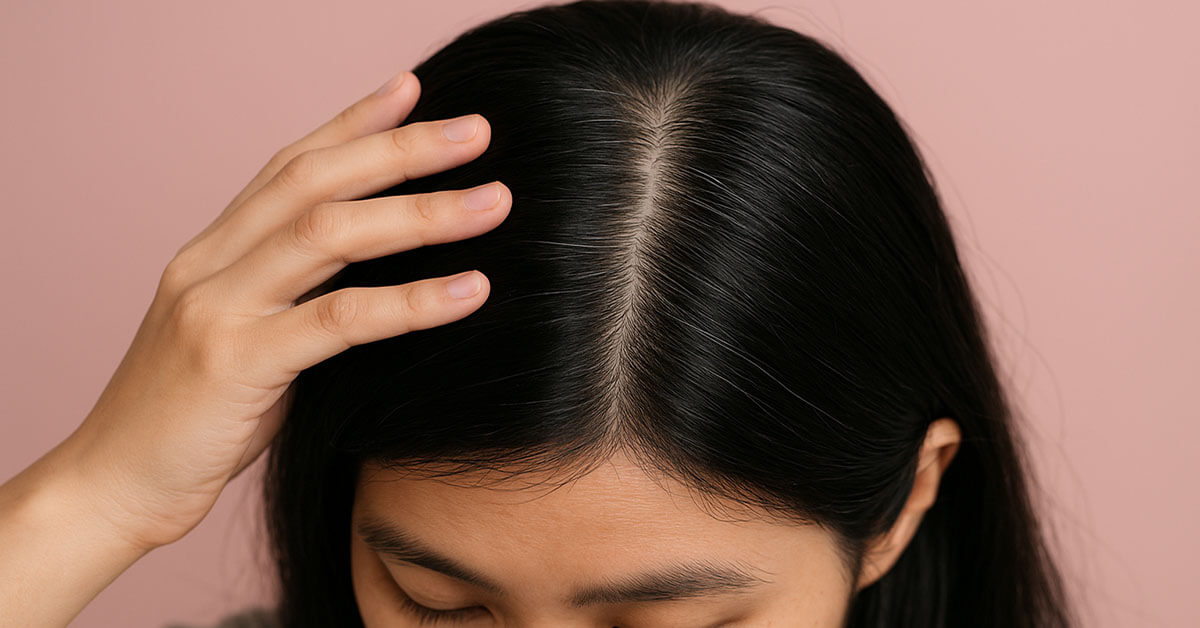
Supplements to Reverse Gray Hair: What You Should Know and Try

Finding your first gray hair can be surprising. For many people, it is a natural part of aging, while for others it starts earlier than expected. Although genetics play a big role, nutrition and oxidative stress also influence how quickly hair loses its pigment. This has led many people to wonder: can certain supplements actually help bring color back to graying hair?
While there is no miracle pill that can reverse gray hair overnight, some nutrients and natural compounds have shown potential to slow down or partially restore pigment by supporting the cells that produce melanin, the pigment that gives hair its color. Let's look at what science and tradition say about the most promising options.
Why Hair Turns Gray
Hair color is produced by cells called melanocytes. These cells create melanin, the same pigment that colors your skin and eyes. Over time, melanocytes become less active and may eventually stop producing melanin. The result: hair grows out gray or white.
Several factors accelerate this process. Oxidative stress, caused by free radicals, damages hair follicles and pigment cells. Deficiencies in certain minerals and vitamins can also affect melanin production. Smoking, chronic stress, and environmental pollution can further speed up the loss of pigment.
Can Supplements Reverse Gray Hair?
There is no guaranteed supplement that will reverse gray hair for everyone. However, research suggests that certain nutrients may help delay graying or improve pigment production in people with nutritional deficiencies or oxidative stress.
Here are the most discussed and studied supplements that may help restore natural hair color, or at least slow down the graying process.
1. Catalase
Catalase is an enzyme that helps break down hydrogen peroxide in the body. When hydrogen peroxide builds up inside hair follicles, it can bleach the hair from within. Some researchers believe that this accumulation contributes to graying over time.
By supplementing with catalase, the idea is to neutralize this buildup and protect melanocytes from oxidative damage. While more studies are needed, catalase remains one of the most popular ingredients in "anti-gray" formulations.
Pure catalase supplements are difficult to find, but the enzyme is often included in multi-enzyme blends or dedicated "anti-gray hair" formulas available on the market.
✔️ Typical Dosage Range: 250-500 mg per day, often included in multinutrient hair formulas.
2. PABA
PABA (Para-Aminobenzoic Acid) is sometimes referred to as "the gray hair vitamin." It is part of the B-complex family and has been studied since the mid-20th century for its potential to restore pigment. In older research, some people taking PABA reported darkening of gray hair, although results have been inconsistent.
Experts believe that PABA may support melanin synthesis by enhancing folate and other B-vitamin activity in the hair follicle. It is not a guaranteed fix, but it may help if your diet is lacking in certain B vitamins.
✔️ Typical Dosage Range: 200-500 mg per day, taken with a full B-complex supplement.
3. Copper
Copper is a trace mineral that plays a crucial role in melanin production. It is a cofactor for the enzyme tyrosinase, which converts the amino acid tyrosine into melanin. Low copper levels have been linked to early graying in several observational studies.
However, copper should be taken carefully: too much can be toxic. If your diet is low in copper-rich foods such as nuts, seeds, shellfish, and organ meats, a small supplement may help restore balance.
✔️ Typical Dosage Range: 1-2 mg per day. Avoid high doses unless recommended by a healthcare professional.
4. Fo-Ti (He Shou Wu)
Fo-Ti, also known as He Shou Wu, is a traditional Chinese herb famous for its reputation as a longevity and hair-darkening tonic. Ancient texts describe it as a remedy to restore vitality and natural hair color. Modern studies suggest that compounds in Fo-Ti may promote melanin production and improve circulation to the scalp.
While research in humans is limited, Fo-Ti is traditionally and widely used in China and other parts of East Asia in natural formulas for gray hair prevention. It is typically taken as a capsule or tea made from the prepared root.
✔️ Typical Dosage Range: 500-1000 mg of prepared Fo-Ti extract per day.
5. L-Tyrosine
L-Tyrosine is an amino acid that serves as a building block for melanin. Without enough tyrosine, the body cannot efficiently produce pigment. Some supplements include L-tyrosine to support natural coloration in both skin and hair.
A study on healthy adults found that supplementing tyrosine improved stress response and mood, which might indirectly benefit hair by reducing oxidative stress. Though evidence is still emerging, tyrosine is a safe and supportive nutrient for general hair health.
✔️ Typical Dosage Range: 500-1500 mg per day, preferably on an empty stomach.
6. B-Complex Vitamins
The B-complex vitamins (including B5, B6, B12, folate, and biotin) contribute to healthy hair growth and pigment. Deficiency in these nutrients has been linked to premature graying. B12 in particular supports oxygen delivery to hair follicles, while biotin and folate help strengthen the keratin structure of hair strands.
Many people who see early graying due to vegan diets, malabsorption, or stress may benefit from a complete B-complex supplement.
✔️ Typical Dosage Range: 1 capsule daily containing 100%-300% of the recommended daily value of each B vitamin.
7. Antioxidants (Resveratrol, NAC, Alpha Lipoic Acid)
Oxidative stress is one of the biggest enemies of hair pigmentation. It damages melanocytes and accelerates the loss of color. Antioxidants like resveratrol, NAC, and alpha lipoic acid help neutralize free radicals, reducing oxidative damage inside the follicle.
Although these compounds do not directly create melanin, they may preserve the cells that do. Taking them regularly may support healthier, shinier hair with better pigment retention.
✔️ Typical Dosage Range: Resveratrol 100-250 mg, NAC 600 mg, Alpha Lipoic Acid 300 mg daily.
8. Vitamin D and Iron
Low vitamin D or iron levels can disrupt hair follicle health and pigment production. Several studies have found that people with premature graying tend to have lower blood levels of these nutrients. Ensuring you have enough of both can help maintain stronger, healthier hair.
If you suspect a deficiency, a simple blood test can confirm it before starting supplements. Combining these nutrients with a balanced diet rich in protein, leafy greens, and sunlight exposure is the best approach.
✔️ Typical Dosage Range: Vitamin D3 1000-2000 IU and Iron 15-30 mg daily, adjusted according to blood levels.
Lifestyle Tips to Support Hair Pigment
Even the best supplements will not work without healthy daily habits. Reducing oxidative stress, eating nutrient-dense foods, and avoiding smoking can make a visible difference. Here are a few simple tips:
- Eat foods rich in copper, zinc, and antioxidants such as nuts, seeds, and berries.
- Manage stress through meditation, deep breathing, or regular exercise.
- Get enough sleep to allow your body to repair pigment cells.
- Avoid harsh hair treatments or excessive heat styling that damage follicles.
Bottom Line
While there is no guaranteed way to reverse gray hair, certain supplements can support your body's natural pigmentation process and slow down further graying. The key is consistency, a balanced diet, and addressing any deficiencies that may be contributing to the problem.
If your graying started suddenly or at a young age, it may be worth discussing with a healthcare professional to rule out underlying issues like thyroid imbalance or vitamin deficiency. With patience and the right support, you can keep your hair healthier, stronger, and more vibrant for longer.
FAQs
Can supplements actually reverse gray hair?
There is no guaranteed way to reverse gray hair. Some people see improvements when they correct deficiencies or reduce oxidative stress with targeted nutrients. Results vary and depend on genetics, age, and overall health.
What are the best supplements to try for gray hair?
Common options include catalase, a full B-complex, copper in low doses, L-tyrosine, antioxidant blends like NAC and alpha lipoic acid, and traditional herbs such as Fo-Ti. If you suspect low vitamin D or iron, test and correct under medical guidance.
How long does it take to see results?
Hair grows slowly. If a supplement helps, you may notice small changes in 8 to 12 weeks, with clearer results after 3 to 6 months. Consistency is key. If nothing changes after 6 months, reconsider your plan with a professional.
Does a vitamin deficiency cause premature gray hair?
It can. Low levels of B12, folate, vitamin D, copper, or iron are associated with earlier graying in some people. A simple blood test can check these markers, then you can supplement to correct any deficiency.
Is catalase effective for gray hair?
Evidence is mixed. Catalase helps break down hydrogen peroxide, which may bleach hair from the inside. Some users report benefits, others do not. Pure catalase is hard to find as a standalone supplement, but it often appears in multi-enzyme blends or anti-gray hair formulas.
Is Fo-Ti safe to use?
Fo-Ti is traditionally used in China and East Asia for hair and vitality. Prepared root forms are preferred. It can interact with medications and may affect the liver in rare cases. If you have liver issues or take prescriptions, talk to your doctor first.
Should I take copper for gray hair?
Only if you are low. Copper supports melanin production, but too much can be harmful. Aim for low doses and avoid stacking multiple products that contain copper. Check your multivitamin first, then discuss testing with your doctor.
Can stress make hair turn gray?
Yes, stress can increase oxidative stress and may speed up pigment loss. Managing stress with sleep, exercise, and relaxation techniques supports overall hair health and may help slow graying over time.
What lifestyle changes help alongside supplements?
Focus on a protein-rich diet with minerals and antioxidants, stop smoking, limit harsh chemical treatments, protect hair from heat, and maintain good scalp care. These basics improve the environment where hair grows.
Who should avoid gray-hair supplements?
People who are pregnant or breastfeeding, those with liver disease, thyroid disorders, or on prescription medications should consult a healthcare professional before starting. Always review potential interactions and start with low doses.
This article was originally published on Stackbb, your trusted source for science-based supplement guides.







